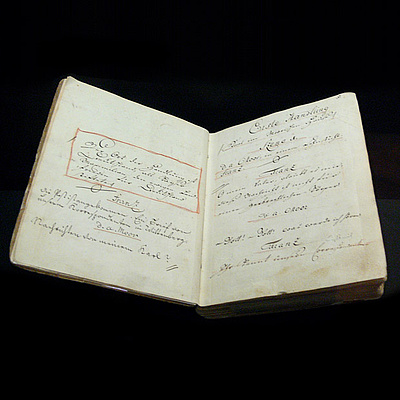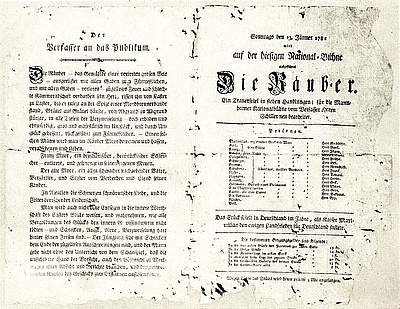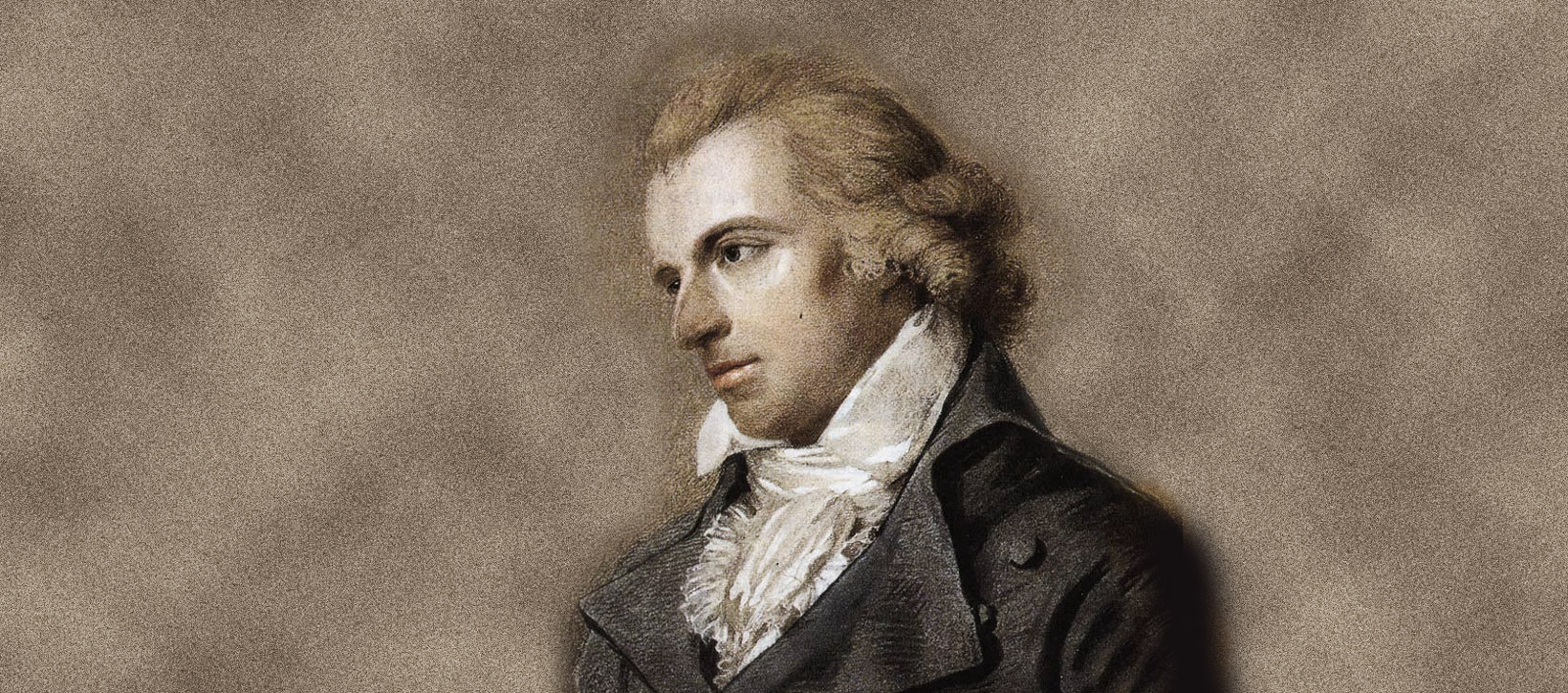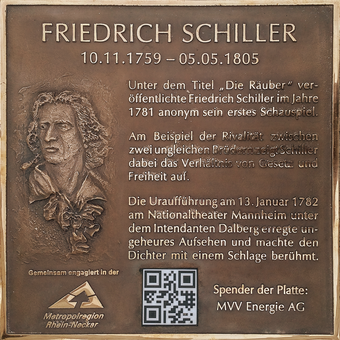1782 The Robbers
Friedrich Schiller (10.11.1759 - 09.05.1805)

Friedrich Schiller published his first play anonymously in 1781 under the title "The Robbers. Using the example of the rivalry between two unequal brothers, Schiller shows the relationship between law and freedom. The premiere on January 13, 1782 at the National Theater in Mannheim under the artistic director Dalberg caused an enormous sensation and made the poet famous in one fell swoop.
Friedrich Schiller was born in Marbach on November 10, 1759, the son of an officer and wound surgeon. At the age of fourteen, Friedrich was sent by his sovereign, the Württemberg Duke Karl Eugene, to the "Karlsschule", a military academy. There the students were subjected to a harsh military drill, from which Schiller suffered greatly. The study of law and later medicine captivated the young man far less than the works of Rousseau, Klopstock and Shakespeare, which were banned at the academy. At the age of 13, Schiller had already begun writing plays. His first poem was printed in 1776. In this year, Schiller, longing for freedom, was already writing drafts of "The Robbers". After passing his exams and writing his dissertation, Schiller left the military academy in December 1880 and became a regimental doctor. As such, however, he is not allowed to wear civilian clothes and the low salary allows him only a modest life.
In 1781 Schiller completed his "Robbers" and published it anonymously. Using the example of the rivalry between the unequal brothers Franz and Karl, Schiller shows the relationship between law and freedom, as well as the conflict between reason and emotion. Wolfgang Heribert von Dalberg, director of the National Theater founded a few years earlier by Elector Carl Theodor, urges Schiller to rework his drama for the stage and to defuse the clear criticism of the feudal system by moving the action into the past.

On January 13, 1782, "The Robbers" is premiered at the National Theater with August Wilhelm Iffland in the role of Franz Moor. Without the permission of his sovereign, Schiller travels secretly to Mannheim for the premiere, and so the 21-year-old poet is able to witness the jubilation and overwhelming success as well as the fierce emotions of the audience. An eyewitness reports: "The theater resembled a madhouse, rolling eyes, clenched fists, hoarse outcries in the audience. Strangers fell into each other's arms, women staggered to the door close to fainting. It was a general dissolution like chaos, from whose mists a new creation bursts forth."
Schiller is now famous in one fell swoop.
In May 1782, he again travels to Mannheim without leave permission and is punished for this with two weeks of arrest. In addition, he is banned from any poetic activity under penalty, as well as from visiting foreign countries, which includes Mannheim in Baden from Stuttgart's point of view. As a result, Schiller flees to Mannheim with his friend Andreas Streicher at the end of September, putting himself in a difficult position, because as a deserted military doctor he now has no income. Because the director Dalberg does not want to perform Schiller's new drama "The Conspiracy of Fiesco in Genoa", Schiller sells the play to the Mannheim bookseller Christian Friedrich Schwan and leaves Mannheim in December 1782.
Schiller fears that he will be extradited to Duke Karl Eugen. Under a pseudonym, he finds lodgings with Henriette von Wolzogen, the mother of a student friend in Thuringia. But then Dalberg offers him the position of a theater poet, and Schiller returns to Mannheim as early as the end of July 1783. But only a few weeks after his arrival in Mannheim, Schiller fell ill with malaria, which was rampant in the swampy Rhine valley at the time.
In January 1784, his "Fiesco" can finally be premiered at the National Theater, but without the hoped-for success. The Frankfurt premiere of the drama "Kabale und Liebe" in April is far more successful.
On June 26, Schiller gives the much-acclaimed lecture on "Die Schaubühne als eine moralische Anstalt" to the "Kurfürstliche deutsche Gesellschaft" (Electoral German Society) in Mannheim. His contract as a theater poet is not renewed, however, and ends in August 1784. As a result, Schiller soon finds himself in financial difficulties and even almost in debt. The couple Anton and Anna Hölzel saved him from this fate. They settled Schiller's debts and took him into their home in B 5,8 until he left Mannheim in April 1785.
Via Leipzig and Dresden, Schiller finally arrived in Jena and Weimar, where he made his home. He received many honors: appointment as professor at the University of Jena, conferral of the title Hofrat, and in 1792 he was made an honorary citizen of the French Republic for the "Robbers" and a few years before his early death in 1805 he was even elevated to the peerage.
From then on, however, the "Robbers" were among the most important works of world literature and one of the most frequently performed plays at the National Theater in Mannheim, which today proudly calls itself the "Schillerbühne".



